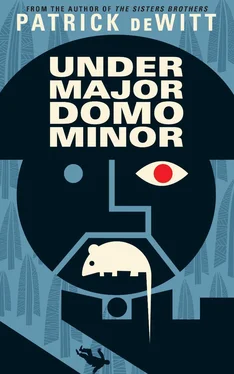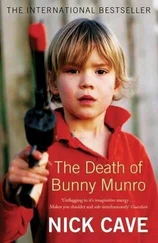Here Mr Olderglough nodded, as if he had been found out. “We have been through a good deal together, you and I, and so I feel I can speak to you in confidence, and as a peer. Are you comfortable with that?”
“Of course, sir.”
“Very good. Well, boy, if I’m to address the truth of the matter, none of the coming guests is what might be called desirable company. Actually, I have in the past found them to be distinctly undesirable.”
“In what way, sir?”
“In many ways which you will, I fear, discover for yourself. But your question, if I understand correctly, is to wonder which of the two parties is the worse, isn’t that right?”
“I suppose so, sir.”
“Then I must tell you that the Count and Countess merit that prize, handily. And while I feel on the one hand duty-bound to take the heavier burden unto myself, I must also recognize that I simply haven’t the capacities I once did. To look after people such as those who are coming to stay with us is a young man’s game, and I am not young any longer, and so I take the simpler path, though you may rest assured that when I say simpler, I do not mean simple. The Duke and Duchess are no stroll in the park, and I can attest to that personally, and at length.” Mr Olderglough stepped closer, his eyes filled with ugly memories. “Be on your guard with these people, boy. They answer to no one. They never have, and they never will.”
These words played in Lucy’s head as he stood on the platform awaiting the Count and Countess’s arrival. As the train came into the station, he could hear a man’s wild cackling; when the Count emerged from his compartment he was quite obviously drunken, swaying in place, a cigar planted in the fold of his slick, blubbery mouth. His skull was a softly pink egg, his eyes blood-daubed yolks — he drew back from the sunlight as one scalded. Once recovered, he focused on Lucy, gripping him by the lapel. “Ah, Broom, happy to see you again, boy.”
“Yes, sir, nice to see you, as well. Only I’m not Mr Broom; my name is Lucy.”
“What?”
“My name is Lucy, sir.”
The Count stared. “You’re Broom.”
“I’m not he, sir.”
“Well, where has Broom run off to?”
“He has died, sir.”
The Count leaned back on his heels. Speaking over his shoulder and into the blackened compartment, he said, “Did you know about this?”
“About what?” said the Countess.
“Broom is dead.”
“Who?”
“The servant lad? Broom? You were so fond of him last time we visited.”
“Oh, yes, him. Nice boy — nice colouring. He’s dead, you say?”
“Dead as dinner, apparently.”
“How did he die?”
“I don’t know how.” The Count looked at Lucy. “How?”
Lucy said, “He was possessed by a wickedness and so cast himself bodily into the Very Large Hole, sir.”
The Count made an irritable face.
“Did he say a very large hole ?” the Countess asked.
“Yes,” said the Count.
“Large hole ?”
“Yes.”
The Countess paused. “Well, I don’t want to hear another word about it.” And with this, she emerged: a corpulent, panting woman with frizzed black hair, a crimson neck, and a fierce displeasure in her eye which Lucy took to be travel fatigue but which he would soon discover was simply her root mood. When he held out his hand to help her from the train, she cracked him across his knuckles with her folding fan, a stinging blow that took his breath away. Pushing past him, she stepped up the path and towards the castle, murmuring vague threats or regrets to herself. Once she was clear of earshot, the Count addressed Lucy breathily, and through a shroud of bluish smoke.
“When is the dinner service?” he asked.
“Six-thirty, sir.”
“Unacceptable.” The Count pressed a coin into Lucy’s palm. “If you could scare me up some type of holdover, that would suit me.”
Lucy studied the coin. It was a foreign currency, and quite useless to him. “Holdover, sir?” he said.
“Something to chew on.”
“Something to eat.”
“I like salt. A meat. Don’t let the Countess see.”
“No, sir.”
“You’re on your own if she does.”
“Yes.”
“And I suppose a bath is in order. Can you see to it?”
“Surely, sir.”
“Fine. Now you fetch us our baggage and then get started on the rest. You seem a good lad, but how many have let me down in the past? Indeed: too many to name.” He trundled up the hill on stumpy legs, and Lucy turned to watch the porter offload the trunks and cases. It was the same porter Lucy had seen before, when the Baroness arrived. They were much the same age, and Lucy approached to assist him.
“What did he give you?” the porter asked, and Lucy showed him the coin. The porter smiled, and produced an identical valueless coin from his own pocket. They each cast their coin to the ground, and as the train pulled away from the station the porter swung onto the caboose. He bowed at Lucy, and Lucy bowed at him, and the both of them returned to their work.
The Count was listlessly fingering the contents of his steamer trunk. He was naked as the day he was born, and other than his height, looked much as he had at that initial emergence. The Countess, on the opposite side of the room, sat at the vanity, admiring her toiletries, laid out in some obscure codification of her own hostile design. In the corner, unseen behind a folding screen, Lucy was pouring out the final cauldron of water for the Count’s bath. He had a sizeable salami up his sleeve and was waiting for the moment when the Countess was not about, that he might unsheathe and present it to the Count. He was hopeful this would happen sooner rather than later, as the salami was cold and oily and felt repugnant against his bare flesh.
The Count held a white silken shirt up before himself. He turned to face the Countess, who told him, “You’ll want to go darker. You’re so ruddy these days.”
The Count sighed.
“You take too much tobacco,” she said.
“It’s more the drink, I fear.”
“Well, whatever the culprit, you mustn’t wear white if you can avoid it.”
He stood before the tilted looking-glass, dolefully assessing his countenance. “So many pitfalls in a life,” he said.
“Yes.”
“The consequences of our appetites confound me. But, you know what my father said: ‘A modesty of appetite represents a paucity of heart.’ He swapped the white for a blue shirt, and appeared pleased, for it truly did mask his hue. “I find myself wondering what’s for dinner,” he said, to no one.
Lucy stepped out from behind the screen. “Cold dill and yoghurt soup, sliced calf tongue in butter, pork knuckle in nettle sauce, and for dessert, a fruit tart.”
The Count and Countess stared at Lucy.
“Did you know he was in the room?” the Count asked.
“I did not,” said the Countess.
“Nor I.”
“I wish I had known.”
“As do I.”
“I knocked before entering,” said Lucy.
The Count said, “I heard nothing like a knock.”
“Neither did I,” said the Countess.
“You should knock harder,” said the Count.
“I’m sorry, sir,” Lucy said.
“Or offer a verbal greeting.”
“I didn’t want to disturb you.”
“But you’ve done just that, haven’t you?” said the Countess. She turned to the vanity, and in a spasm of pique began passionately combing her hair. The Count set his blue shirt to the side, for he had located something of consequence in his navel, and now worked fingers like pincers to remove it.
“Is my bath ready?” he asked Lucy.
“It is, sir.”
The Count padded around the screen and submerged a thumb in the water. Finding the temperature to his liking, he daintily drew a leg over the lip of the tub and eased into the bath, emitting a puff of air as he did so. “Tell me more about this tart, boy,” he said.
Читать дальше












